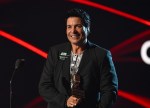Music careers seldom happen overnight. Sometimes it takes years in the making. At times, even decades. But that doesn’t mean the hustle isn’t worth the prize. Take the rise to fame of bilingual Mexican-American artist Eddie Zuko as a testament. He’s worked a full-time job while crafting and perfecting his distinctive music. Now, over 10 years after his start, he’s selling out tours and performing at huge festivals, all without releasing a full debut album yet.
Hailing from Imperial Valley, CA, Eddie Zuko—born Heriberto Xavier Culebro—always known he wanted to be an artist. He recalls having videotapes of himself at three years old singing Spanish songs to his family as entertainment. “[In the tape,] I’m dancing around in the backyard singing. I got a whole cowboy hat on there [and] I already had songs memorized back then. And I don’t remember this, right? I just see it on video, and I’m like, ‘Dang, that’s crazy,’” he tells Remezcla over a Zoom call from San Diego, CA, where he currently resides.
Since then, he has absorbed more musical genres such as hip-hop and rap from his cousins and Mexican music from his mother. Some of his primary influences include 50 Cent, Vicente Fernandez, Valentin Elizalde, and Juanes. In one way or another, these artists formed his now signature melting pot-esque musical style: a carefully-curated mixture of reggae, hip-hop, rap, and rock en español.
However, the raspy vocalist’s first musical style was heavily rap-inspired. In eighth grade, this influence led him and his cousins to create his first-ever mix that became his first beat to rap to. Although he doesn’t create music with his cousins anymore, he still credits his family as key supporters who have been there since the beginning of his career. Not only did his family spark his interest in producing and rapping, but his Mexican-American culture also inspired his lyrics too.

“I always thought [my upbringing] was important to put in my music because it was my experience, and I never heard anyone really sing about these things,” he says. “It’s just a strong part of my identity; growing up [with] all those memories and things that we used to do.” Take “Made” off El Zuko EP, for example. In the song, he references intimate moments like, “Chillin at my Nanas eatin a lil sopita,” and his nana saying, “Mijo no te olvides / Siempre dale gracias a diosito pa este día’,” which are anecdotes that many of his listeners can relate to.
But even with the support of his family and early musical drive, his music career hasn’t been easy. Though Zuko fantasized about his dream artist career, the reality was he had to hustle and work throughout the process following high school. Before being able to work as a full-time artist, Zuko had to work at jobs like at a military base, coffee shop, and RV park to help pay the bills while still pursuing his musical dreams. “I never saw any other type of path for me. I was just like, ‘Nah, I’m gonna do this.’ Obviously, it took a long time, I’m 29 now, but I’ve been trying to do this since I was 17.”
Now as a full-time musician, he still splits his time. This time, it’s between making music and marketing his content—which he says is important nowadays, especially in the digital age, where virality can change your life. “That’s a whole ‘nother thing that I didn’t do before, and now it’s like almost half of my time goes into the content because how are you going to promote this song that you took all this time to make?” Zuko says. “If you’re not thinking about that side, then it’s going to fall on deaf ears, and nobody’s going to hear it. So that takes a lot of my time too, but it helps creatively. I feel like they help each other.”

Overall, he’s a fan of creative marketing approaches (his personal take is his “Tio-Core” alter-ego) and has a clear understanding that the marketing “buzz” is part of delivering a successful hit. In fact, he proved it earlier this year with his TikTok viral track, “Still.” The reggae-inspired reinvented cover wasn’t so popular at first, though.
“I always thought [my upbringing] was important to put in my music because it was my experience, and I never heard anyone really sing about these things.”
Like much of Zuko’s life, it was also a process to make it happen. The singer would switch the content’s captions and post the same videos to see what his audience would engage with more. Six months after the initial post, “Still” started to reach an even larger audience. Once it became a viral trend, it gave him leverage to clear the song’s sample, originally from Alton Ellis’ “I’m Still In Love,” though some may know it from Sean Paul’s “I’m Still In Love With You.”
With the sample cleared, Zuko knew he had to keep the momentum going. “I just had to figure out, ‘How can I keep a buzz going with the song so I don’t lose the steam on it?’” he recalls. “And that’s what we did with the trend and just continued to post other people’s videos about it to hold it over until we could actually drop it, which wasn’t until like a month later.” Luckily, it continued to be a success, and in return, helped him sell tickets to what resulted in a sold-out tour within 24 hours.

Today, not only does he finally have the time to work on his upcoming debut album, but he’s also enjoying the fruits of his hard-worked labor. He’s performing in upcoming massive festivals like Outside Lands and Austin City Limits, all while authentically representing and connecting with people that resonate with his story.
“I feel like I represent this middle ground, like Selena. I feel like I’m very Mexican, right? But I’m like a pocho. I grew up here. I could see the border. And that’s where I grew up too; going a lot back and forth, right?” Zuko shares. “And that’s completely my upbringing. But [it’s] also living in America, watching American TV, being influenced by American culture. For me, it was hip-hop, mainly.”
“I think that there’s a lot of kids. There’s a lot of people that have the same type of experience. I want to put out music that’s as genuine to me as possible, and I know that it’s going to connect with people out there.”





